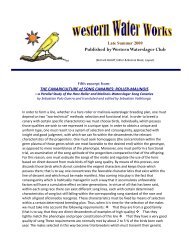Newsletter 1-06.pdf - Western Waterslager Club
Newsletter 1-06.pdf - Western Waterslager Club
Newsletter 1-06.pdf - Western Waterslager Club
Create successful ePaper yourself
Turn your PDF publications into a flip-book with our unique Google optimized e-Paper software.
The message is dated August 21, 2005.Donna NoelHi, I read an article written by J. A. Snider. She states the hen inherits the song of herfather and then gives the song to her sons. The father gives his song to his daughters.New hens: breed with male from the same line. If you don't have a related male, breedthe hen to your best male. Using your best male the off spring may show freedom insong & good tone. The article came from ACBM (American Caged Bird Magazine)February 1985. For my older hens I let them go three times but, foster the third clutch.Also she gets the male with her if he will help. Both my AS males are good fathers. Withbreeding AS you also need to keep in mind the size. Small hens are a sign that there is toheavy line breeding.Marie RussellThis article (mentioned by Donna above) is included in the handbook provided to all newmembers of DRAGON, ASC Chapter 22 along with two dozen more articles which coverevery topic one can imagine. Members have access to the entire library of articles- thereare hundreds and hundreds (more than four file cabinet drawer’s worth).The best possible thing to do is to listen to the song of the father when evaluating the hen.(The song of the brothers is not as good an indicator of what the hen may be carryingand a hen's call notes are a chancy thing at best to make a determination of quality on.)Should the father sire more daughters than you wish to breed, evaluate the hens onconformation and make your determination on that basis. Whenever possible, try tolisten to the hen's father when purchasing a hen. Then breed your new hen to your bestmale. After three generations of breeding the hen's best son back to her (son. grandson,etc.) you'll be left with birds which carry her song.In my opinion, three generations is pushing it sort of far for line breeding this closely(parent to offspring)- be sure to select ONLY the healthiest birds to breed if breedinggrandsons and great grandsons back to their mother. If the birds start shrinking in size,the line breeding is too close for sure. I do know of successful breeders who use intensiveline breeding, but there is a finite lifespan to a line that is bred too closely- birds tend to beless hardy, fertility decreases, and the song becomes stale. It is true that line breedingAmerican Singers can result in becoming a dominating presence at the shows- but afterclosely examining the past 10+ years of show results I have concluded that breeders whorely heavily on line breeding stay on top for a limited number of years, typically four orfive. I know personally of several breeders who follow a very loose pattern of linebreeding- breeding within certain lines of birds, but rarely closer than cousins- and havemanaged to win consistently for twenty years. They never sweep a show, but they rarelygo home empty handed, either.Just my two cents worth...Donald Perez



